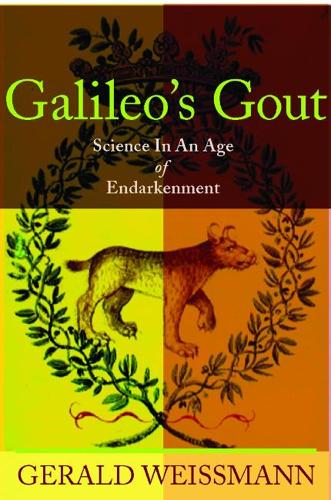
Galileo's Gout: Science in an Age of Endarkenment
(Hardback)
Publishing Details
Galileo's Gout: Science in an Age of Endarkenment
By (Author) Gerald Weissmann
Bellevue Literary Press
Bellevue Literary Press
19th April 2007
United States
Classifications
General
Non Fiction
509
Physical Properties
Hardback
192
Width 161mm, Height 237mm
397g
Description
Oliver Sacks, Richard Selzer, Lewis Thomas . . . Weissmann is in this noble tradition. Los Angeles Times
Weissmann introduces us to a new way of thinking about the connections between art and medicine. New York Times Book Review
Embryonic stem cell research. Evolution vs. intelligent design. The transformation of medicine into health care. Climate change. Never before has science been so intertwined with politics, never have we been more dependent on scientific solutions for the preservation of the species.
Transporting us across more than four hundred years of pivotal moments in science and medicine, Weissmann distills historys lessons for todays new age of sect and violence: The Endarkenment. Among others, he lingers with Galileo and his daughter in seventeenth-century Florence, Diderot and dAlembert in Enlightenment Paris, William and Alice James in fin de sicle Boston, James Watson as the John McEnroe of DNA, and Craig Venter decoding the genome at the dawn of the twenty-first century. Weissmanns message is clear: Experimental science is our defenseperhaps our best defenseagainst humbug and the Endarkenment.
A rare amalgam of incisive polemic and rich, anecdotal narrative, this is humanistic science writing at its best. Weissmanns reflections on the historical roots of the current culture wars in science and medicine again reveal him to be, as Nobel Prize-winner Eric Kandel says by any standard, one of the major essayists of our time.
Gerald Weissmann is a physician, scientist, editor, and essayist whose collections include Epigenetics in the Age of Twitter: Pop Culture and Modern Science; Mortal and Immortal DNA: Science and the Lure of Myth; and Galileos Gout: Science in an Age of Endarkenment. He is professor emeritus and research professor of medicine at New York University School of Medicine. His essays and reviews have appeared in numerous publications worldwide, including the London Review of Books and New York Times Book Review. The former editor-in-chief of the FASEB Journal, he is now its book reviews editor. He lives in Manhattan and Woods Hole, Massachusetts.
Reviews
Select Praise for Gerald Weissmann
"Gerald Weissmann is Lewis Thomas's heir." --Robert Coles
"Weissmann has a strong and well-informed interest, unusual for a scientist, both in poetry and in art." --Freeman Dyson
"[Weissmann] bridges the space between science and the humanities, and particularly between medicine and the muses, with wit, erudition, and, most important, wisdom." --Adam Gopnik
"America's most interesting and important essayist." --Eric Kandel
"How I envy the reader coming upon Dr. Weissmann's elegant, entertaining essays for the first time!" --Jonas Salk
"Dr. Weissmann's juggling with the balls of global politics, biology, medicine, and culture in the framework of history is breathtaking." --Bengt Samuelsson, Nobel Laureate and former chairman of the Nobel Foundation
"The premier essayist of our time, Weissmann writes with grace and style." --Richard Selzer
"An absolutely first-rate writer." --Kurt Vonnegut
"[Weissmann] is a man of wide culture, a captivating and graceful writer." --New Yorker
"Weissmann introduces us to a new way of thinking about the connections between art and medicine." --New York Times Book Review
"Oliver Sacks, Richard Selzer, Lewis Thomas . . . Weissmann is in this noble tradition."--Los Angeles Times
"As a belles-letterist, Weissmann is the inheritor of the late Lewis Thomas . . . Like Thomas, he's a gifted researcher and clinician who writes beautifully. Unlike Thomas, he is an original and indefatigable social historian as well." --Boston Globe
"He writes as a doctor, a medical scientist, a knowing lover of art and literature and a modern liberal skeptic. But more than anything else, Weissmann writes as a passionate and wise reader." --New Republic
"Weissmann is a master of the essay form. His witty and elegant prose makes the toughest subject matter not only accessible but entertaining." --Barnes and Noble Review
"[Weissmann] is a Renaissance Man. . . . He'll stretch your mind's hamstrings." --Christian Science Monitor
"[Weissmann's essays] intertwine the profound connections of science and art in the context of our modern era . . . to illuminate the ongoing challenges scientists face in dealing with scrutiny and criticism, from colleagues and from our broader society." --Science
"Weissmann not only endeavors to connect the realms of literature and medicine, but also to create community among readers in light of class, race, religion, and age." --Glassworks Magazine
"Essays that brim with knowledge and bubble with attitude." --Kirkus Reviews
"Erudite, engaging, and accessible." --Library Journal
"Juicy and conversational." --Booklist
"Weissmann models his work after that of his mentor, Lewis Thomas. . . . His ideas . . . are every bit as important." --Publishers Weekly
"Weissmann's humanist, sometimes sardonic, voice binds together disparate strands to show how all human endeavor is linked. . . . Weissmann clearly sees how history obfuscates the work of women, people of color and immigrants, and tries to alter that." --Shelf Awareness for Readers
Author Bio
Gerald Weissmann is a physician, scientist, editor, and essayist whose collections include Epigenetics in the Age of Twitter: Pop Culture and Modern Science; Mortal and Immortal DNA: Science and the Lure of Myth; and Galileo's Gout: Science in an Age of Endarkenment. He is professor emeritus and research professor of medicine at New York University School of Medicine. His essays and reviews have appeared in numerous publications worldwide, including the London Review of Books and New York Times Book Review. The former editor-in-chief of the FASEB Journal, he is now its book reviews editor. He lives in Manhattan and Woods Hole, Massachusetts.
